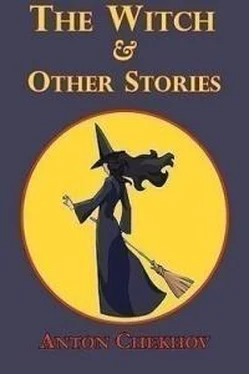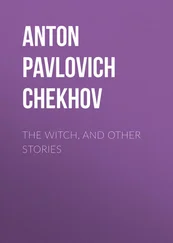They began ringing the bells in the church on the other side of the river.
Near the burning hut it was hot and so light that one could distinctly see every blade of grass. Semyon, a red–haired peasant with a long nose, wearing a reefer–jacket and a cap pulled down right over his ears, sat on one of the boxes which they had succeeded in bringing out: his wife was lying on her face, moaning and unconscious. A little old man of eighty, with a big beard, who looked like a gnome—not one of the villagers, though obviously connected in some way with the fire—walked about bareheaded, with a white bundle in his arms. The glare was reflected on his bald head. The village elder, Antip Syedelnikov, as swarthy and black–haired as a gypsy, went up to the hut with an axe, and hacked out the windows one after another—no one knew why—then began chopping up the roof.
"Women, water!" he shouted. "Bring the engine! Look sharp!"
The peasants, who had been drinking in the tavern just before, dragged the engine up. They were all drunk; they kept stumbling and falling down, and all had a helpless expression and tears in their eyes.
"Wenches, water!" shouted the elder, who was drunk, too. "Look sharp, wenches!"
The women and the girls ran downhill to where there was a spring, and kept hauling pails and buckets of water up the hill, and, pouring it into the engine, ran down again. Olga and Marya and Sasha and Motka all brought water. The women and the boys pumped the water; the pipe hissed, and the elder, directing it now at the door, now at the windows, held back the stream with his finger, which made it hiss more sharply still.
"Bravo, Antip!" voices shouted approvingly. "Do your best."
Antip went inside the hut into the fire and shouted from within.
"Pump! Bestir yourselves, good Christian folk, in such a terrible mischance!"
The peasants stood round in a crowd, doing nothing but staring at the fire. No one knew what to do, no one had the sense to do anything, though there were stacks of wheat, hay, barns, and piles of faggots standing all round. Kiryak and old Osip, his father, both tipsy, were standing there, too. And as though to justify his doing nothing, old Osip said, addressing the woman who lay on the ground:
"What is there to trouble about, old girl! The hut is insured—why are you taking on?"
Semyon, addressing himself first to one person and then to another, kept describing how the fire had started.
"That old man, the one with the bundle, a house–serf of General Zhukov's…. He was cook at our general's, God rest his soul! He came over this evening: 'Let me stay the night,' says he…. Well, we had a glass, to be sure…. The wife got the samovar—she was going to give the old fellow a cup of tea, and in an unlucky hour she set the samovar in the entrance. The sparks from the chimney must have blown straight up to the thatch; that's how it was. We were almost burnt ourselves. And the old fellow's cap has been burnt; what a shame!"
And the sheet of iron was struck indefatigably, and the bells kept ringing in the church the other side of the river. In the glow of the fir e Olga, breathless, looking with horror at the red sheep and the pink doves flying in the smoke, kept running down the hill and up again. It seemed to her that the ringing went to her heart with a sharp stab, that the fire would never be over, that Sasha was lost…. And when the ceiling of the hut fell in with a crash, the thought that now the whole village would be burnt made her weak and faint, and she could not go on fetching water, but sat down on the ravine, setting the pail down near her; beside her and below her, the peasant women sat wailing as though at a funeral.
Then the stewards and watchmen from the estate the other side of the river arrived in two carts, bringing with them a fire–engine. A very young student in an unbuttoned white tunic rode up on horseback. There was the thud of axes. They put a ladder to the burning framework of the house, and five men ran up it at once. Foremost of them all was the student, who was red in the face and shouting in a harsh hoarse voice, and in a tone as though putting out fires was a thing he was used to. They pulled the house to pieces, a beam at a time; they dragged away the corn, the hurdles, and the stacks that were near.
"Don't let them break it up!" cried stern voices in the crowd. "Don't let them."
Kiryak made his way up to the hut with a resolute air, as though he meant to prevent the newcomers from breaking up the hut, but one of the workmen turned him back with a blow in his neck. There was the sound of laughter, the workman dealt him another blow, Kiryak fell down, and crawled back into the crowd on his hands and knees.
Two handsome girls in hats, probably the student's sisters, came from the other side of the river. They stood a little way off, looking at the fire. The beams that had been dragged apart were no longer burning, but were smoking vigorously; the student, who was working the hose, turned the water, first on the beams, then on the peasants, then on the women who were bringing the water.
"George!" the girls called to him reproachfully in anxiety, "George!"
The fire was over. And only when they began to disperse they noticed that the day was breaking, that everyone was pale and rather dark in the face, as it always seems in the early morning when the last stars are going out. As they separated, the peasants laughed and made jokes about General Zhukov's cook and his cap which had been burnt; they already wanted to turn the fire into a joke, and even seemed sorry that it had so soon been put out.
"How well you extinguished the fire, sir!" said Olga to the student. "You ought to come to us in Moscow: there we have a fire every day."
"Why, do you come from Moscow?" asked one of the young ladies.
"Yes, miss. My husband was a waiter at the Slavyansky Bazaar. And this is my daughter," she said, indicating Sasha, who was cold and huddling up to her. "She is a Moscow girl, too."
The two young ladies said something in French to the student, and he gave Sasha a twenty–kopeck piece.
Old Father Osip saw this, and there was a gleam of hope in his face.
"We must thank God, your honour, there was no wind," he said, addressing the student, "or else we should have been all burnt up together. Your honour, kind gentlefolks," he added in embarrassment in a lower tone, "the morning's chilly…something to warm one…half a bottle to your honour's health."
Nothing was given him, and clearing his throat he slouched home. Olga stood afterwards at the end of the street and watched the two carts crossing the river by the ford and the gentlefolks walking across the meadow; a carriage was waiting for them the other side of the river. Going into the hut, she described to her husband with enthusiasm:
"Such good people! And so beautiful! The young ladies were like cherubim."
"Plague take them!" Fyokla, sleepy, said spitefully.
Marya thought herself unhappy, and said that she would be very glad to die; Fyokla, on the other hand, found all this life to her taste: the poverty, the uncleanliness, and the incessant quarrelling. She ate what was given her without discrimination; slept anywhere, on whatever came to hand. She would empty the slops just at the porch, would splash them out from the doorway, and then walk barefoot through the puddle. And from the very first day she took a dislike to Olga and Nikolay just because they did not like this life.
"We shall see what you'll find to eat here, you Moscow gentry!" she said malignantly. "We shall see!"
One morning, it was at the beginning of September, Fyokla, vigorous, good–looking, and rosy from the cold, brought up two pails of water; Marya and Olga were sitting meanwhile at the table drinking tea.
Читать дальше












